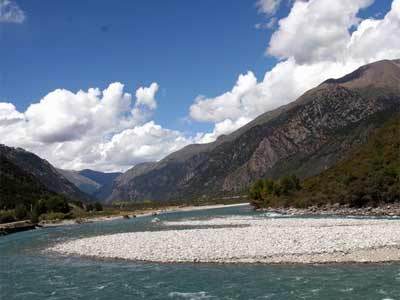NW China appeals relocation of Yellow River water resources
- By Zhang Fang
 0 Comment(s)
0 Comment(s) Print
Print E-mail China.org.cn, January 9, 2013
E-mail China.org.cn, January 9, 2013
Provinces located along the upper reaches of the Yellow River are in outcry over resource allocation as a water project will supply additional water resources to eastern provinces, the Economic Observer reported.
 |
|
Water shortage has been a severe issue for northwestern China's provinces. [File photo] |
The provinces of Qinghai, Gansu, Shanxi, Shaanxi, Ningxia and Inner Mongolia Autonomous Region, located in northwestern China, are facing a severe water shortage, and rely on the Yellow River for a majority of their agricultural needs.
Officials from those provinces claimed that Heibei Province and Tianjin Municipality, both located in north China, would benefit from the South-to-North water diversion project in the coming two years and no longer require water from the Yellow River.
The two places have an annual quota of two billion cubic meters of water from the Yellow River according to the "1987 Water Allocation" plan issued by the State Council in 1987, which earmarked water resources based on data available in the early 1980s.
The South-to-North water diversion project is the world's largest water project and will transfer water from the water-rich south, mainly the Yangtze River, to the north by three routes.
The eastern and central routes are scheduled to open in 2013 and 2014, and will divert water from the Yangtze River into Shandong Province and northern cities, according to China Daily.
A symposium on Yellow River resources was held in Zhengzhou, Henan Province, in November 2012, and representatives from Inner Mongolia submitted policy suggestions to the Yellow River Conservancy Commission.
Wang Baolin, representing the province's Water Resources Department, said the Commission should reallocate the water from the Yellow River currently given to Hebei and Tianjin, and use the additional supply of water to target draught-stricken areas in the northwest. Wang claimed that the new water project will provide an adequate supply of water for Hebei, Tianjin and Shandong, and those regions would not need continued access to the Yellow River.
Ningxia officials agreed that the central government should stop supplying eastern regions with water from the Yellow River.
"Development of the western regions cannot be achieved without water," Wang said.
But Hebei and Tianjin are not willing to give up their quota of water from the Yellow River. The water from the Yellow River is apparently much cheaper than water from the south, according to various news reports.
"Relocating water is relocating money," said Yang Zhenhuai, the former minister of China's Ministry of Water Resources.
Access to water determines the speed of development, and no province will reduce their quota because it would directly impact its local economy, he said.
Access to water resources has become a significant obstacle for western regions attempting to boost their economic growth.
Li Dong, a senior engineer with the commission, said the 1987 plan has been running for 25 years, and the allocation of water resources has changed dramatically over that time.
The water allocation plan for Ningxia and Inner Mongolia submitted to the State Council in 1987 was designed with farming as the primary source of water consumption. However, new industries such as large-scale mining have been growing rapidly over the past decade, and access to water has become scarce.
Economic development is one thing, and ecological protection is another urgent issue to be dealt with. Inner Mongolia, for instance, needs additional water to prevent further desertification.
Qinghai, the source of the Yangtze, Yellow and Lancang Rivers, also faces a water shortage.
The volume of water supplied by the Yellow River falls year-on-year, according to recent statistics. The current volume of river runoff is only 53.5 billion cubic meters, according to Pei Yong, the Commission's director of Water Resources Management and Control Bureau.






Go to Forum >>0 Comment(s)